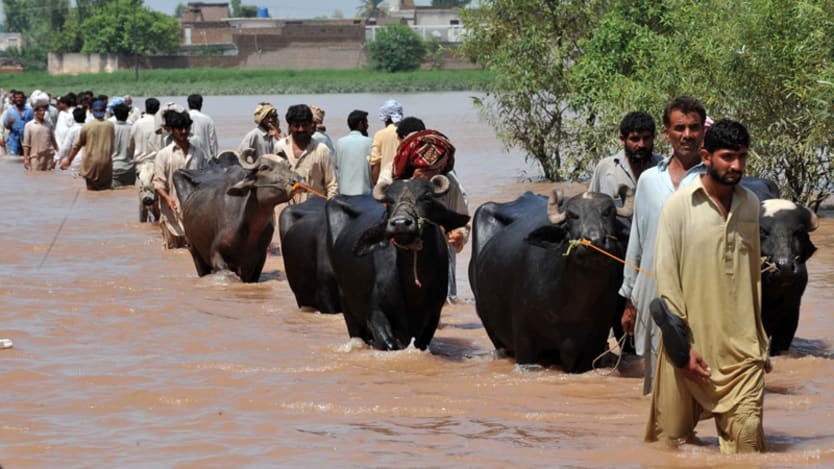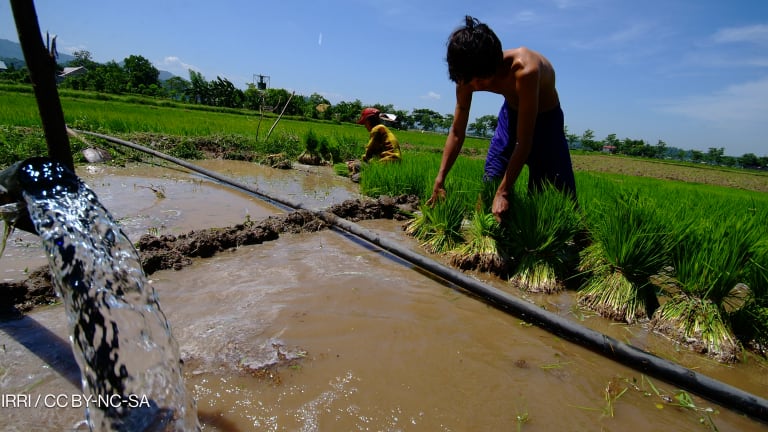
BONN, Germany — The agenda at the COP23 climate conference over the past two weeks has been dominated by the questions of climate finance, and the nitty gritty of the Paris rulebook, as well as issues such as climate risk insurance, which rose to prominence.
But one topic that has dominated headlines globally for years did not get as much attention as many delegates had hoped: the challenge of climate displacement.
“Climate change is not yet recognized as a driver of migration in global negotiations,” Sanjay Vashist, director of Climate Action Network South Asia, told Devex. “Without it, no response can be prepared. That’s dangerous, because climate-induced migration is happening more and more.”
Displacement due to the effects of climate change is a growing phenomenon. Between 2008 and 2016 alone, according to a recent Oxfam report, more than 20 million people were newly displaced by extreme weather disasters each year. In the Pacific island nations of Vanuatu and Fiji, which chaired COP23, more than 55,000 people were displaced because of cyclones in 2015 and 2016. In Pakistan, the devastating 2010 floods alone displaced 20 million people.
While future projections are unclear, hundreds of millions of people who live near the world’s oceans could be forced to relocate if sea levels continue to rise.
Migration crisis: Two years on
In 2015, more than 1 million undocumented migrants and refugees arrived in Europe. A further 3,515 people died attempting to cross the Mediterranean. In November that year, as the “migration crisis” escalated, European leaders met to hash out a solution at the Valletta Summit, relying heavily on the idea that development cooperation could help.
Two years on, Devex is taking a look at some of the policies, priorities, and trends that were put in action then, asking what is working, what isn’t — and what’s yet to even start? Read more about the rise of the migration agenda in European development policy, and follow the rest of the series.
“Migration will become an increasingly important issue as a result of climate change, bringing with it a new set of problems,” Rebecca Carman, climate technical specialist at the United Nations Development Programme, told Devex. “We can anticipate increasing pressures on urban centers, as people move from rural areas, as well as more movements between countries.”
When European leaders met to discuss the “migration crisis” at the Valletta Summit two years ago, climate change was identified as a key driver, and the need to better support resilience and adaptation as the response. But advocates say that is yet to translate into action.
Cosmin Corendea, a legal expert at United Nations University, said that although the proportion of households deciding to move upon experiencing the first climate change stressors has increased globally to more than 30 percent, the issue has not moved up higher on the agenda.
“People, states, and negotiators don’t seem to be ready to acknowledge the fact that [migration] is a subsidiary effect of climate change or human rights violation,” Corendea told Devex. “Migration is perceived as something which happens on the spot. It's more like a humanitarian crisis than looking at it as a permanent process.” The issues of climate change, migration, and human rights are inherently linked, Corendea said.
In 2007, the International Organization for Migration proposed a working definition of “environmental migrants” as “persons or groups of persons who, for reasons of sudden or progressive changes in the environment that adversely affect their lives or living conditions, are obliged to have to leave their habitual homes, or choose to do so, either temporarily or permanently, and who move either within their territory or abroad.”
But to date, there is no internationally accepted or legally binding definition of an environmental migrant. That means that many states end up passively witnessing migration patterns, which are left mostly unregulated, Corendea said. “Without regional and national migration policies, states are not in a position to help those who migrate to urban areas and elsewhere,” he told Devex.
‘Migration as adaptation’
Although climate change-induced migration was neglected at the high-level negotiations, there were plenty of official panel discussions and side events related to the issue during COP23. Those events, however, were mostly about displacement and planned relocation, according to Patrick Sakdapolrak, professor of population geography at the University of Vienna. “I would have liked to see a bigger focus on migration as adaptation and an acknowledgement of the diversity of human mobility in the context of climate change,” he said. “Migration is not per se good or bad.”
Globally, there seems to be an emphasis on limiting migration rather than facilitating it, delegates said. Moreover, few countries have policies in place to promote migration as an adaptation strategy. At a German Development Institute event on how migration can aid adaptation, however, it was obvious that despite its negative perception, migration can also be a boon to communities attempting to manage the impacts of climate change.
Sakdapolrak spoke about a man from an agricultural, rural area in northeast Thailand, who emigrated to Singapore at the age of 19. Staying there for 20 years working on a construction site, he sent $1,700 back to his family in remittances each month. His family, in turn, invested the money by buying land and diversifying their agricultural production. Upon his return to Thailand, he not only built houses for other people, but also invested in a pig farm and a karaoke bar.
“This example shows that using the potential of migration — the skills and money you acquire — can help embrace the potential for adaptation,” Sakdapolrak said. The researcher said three things around this topic need to be addressed: Strengthening the capacity of vulnerable people to deal with risks and enhance their freedom to choose to stay or move; acknowledging the potential of migration; and enabling migrants to support their family back home.
At the same event, UNU’s Corendea, who conducted research on migration in the Pacific, Europe, and Asia, said a regional approach such as the resilience framework in the Pacific is the best solution for regulating migration related to climate change in the short and medium term.
“As an adaptive measure, migration can give people the capacity to stay in place, if migration is temporary. For example, when a member of the household leaves to an urban area, she or he can send remittances back by accessing a labor scheme. This will allow them to eventually come back and continue their life in their home country,” he told Devex.
Corendea said the regional approach — where migration is managed regionally, rather than nationally or globally — also helps to conserve people’s traditions and values in the context of migration. It can also be more efficient and make individual countries feel more engaged than global approaches. Corendea’s recent UNU policy report — “Migration and human rights in the wake of climate change,” which was launched during COP23 — has recommendations for how to implement legal and political frameworks at the state and regional level to cope with climate-related migration in Fiji and Vanuatu, two of the countries most affected by climate change.
But Climate Action Network’s Vashist pointed out that regional cooperation also requires countries to address challenging social issues.
The role of loss and damage
On the last day of COP23, the subsidiary bodies working on the issue of “loss and damage” adopted a draft text for ministerial approval. Acknowledged by the Paris Agreement, loss and damage is a concept that looks at the economic and noneconomic losses and damage people incur because of climate change.
According to the document, an “expert dialogue” — which will take place between April and May 2018 — will facilitate the “mobilization and securing of expertise, and enhancement of support, including finance, technology, and capacity-building, for averting, minimizing, and addressing loss and damage associated with the adverse effects of climate change, including extreme weather events.”
In other words: financing loss and damage is not a permanent agenda item with a dedicated taskforce, as many developing countries had demanded, but a one-off discussion — at least for now. The proposal was also not advanced to the ministerial level. Still, legal expert Corendea called it “a soft step in the right direction.”
“It’s a good technical advancement, which opens new options for 2018,” he told Devex. “But it’s a limited legal step without ministerial involvement.”
Other delegates were more negative. “We’re really disappointed,” said Vashist, who works with 160 NGOs in South Asia. “The Warsaw International Mechanism [WIM] was supposed to prepare a package that ensures relief goes to people suffering on the ground as soon as possible. Without climate finance for loss and damage, the relief will not go, people will continue to suffer and migrate. On the one hand, WIM has deferred it, on the other side insurance companies from developed countries are announcing the insurance schemes, selling it as a product to those suffering on the ground. This is making profit out of distress.”
Calling it a “one-off consultation to discuss finance,” ActionAid’s global lead on climate change Harjeet Singh said the outcome does not ensure that those in developing countries will get help when they need it.
The “EU, Canada and Australia have been hiding behind the U.S.,” he wrote in an email. “They have failed Fiji and failed the world’s climate-vulnerable people.”
Decisions expected in 2018
An international climate displacement agreement might be reached next year, when a series of high-level events are scheduled to tackle the topic. Most policymakers Devex talked to hoped that one of the outcomes will be filling the “legal gap” — the lack of a globally accepted and legally binding definition. According to the Geneva Refugee Convention, climate change is not a reason for flight.
“In order to have a successful implementation of any kind of international law, you need to define the concept well and independently, and you need a common definition,” Corendea said.
According to article eight of the Paris Agreement, the only part of the agreement that mentions displacement, the Warsaw International Mechanism for Loss and Damage is expected to deal with the issue of migration. Since the beginning of this year, a Task Force on Displacement has been operating under WIM, whose recommendations will be presented at COP24 in Poland next year. “This is a positive development, provided that WIM will incorporate the recommendations into its work,” Vera Künzel, policy advisor on climate change adaptation and human rights at NGO Germanwatch, told Devex.
Two global compacts led by the United Nations, one on refugees and one on migration, will also take place in 2018. The latter is set to discuss climate change as a driver of migration. “Including this topic in the final document would be a huge progress,” said Künzel. “It would mean anchoring it in migration policy, not only in the area of climate.”
Experts expect both compacts to come up with definitions and more concrete steps. Formal consultations will take place between February and July 2018, informing the final text, which is to be proposed by the High Commissioner for Refugees in his 2018 annual report.
Another initiative said to have the potential to strengthen the rights of environmental migrants is the Nansen Initiative, led by governments including Switzerland, Norway, Bangladesh, and Costa Rica, which is grappling with the issue of legal protections for climate change-induced refugees who cross national borders. It does not, however, have the authority to enact legally binding results.
Künzel sees the compacts as the most likely vehicles for progress. “Re-negotiating the Geneva Refugee Convention by adding a ‘category’ that is another reason for flight would mean weakening the protection of those falling under the convention,” she explained. “The odds for better protection will increase the more bottom-up, binding regulations we will see, for example when bilateral agreements are expanded or by defining initially voluntary guidelines.”
Some delegates, including the University of Vienna’s Sakdapolrak, said they were taken aback by what they considered an undue and harmful focus on the negative aspects of migration. “I didn’t expect the alarmist discourse about climate refugees, especially with regard to the sheer number we can expect in future,” he said. “My observation is that organizations use these numbers as a vehicle to convey their message. [But] it is dangerous as they contribute — intentionally or not — to the general discourse of fear on migration.”
And Vashist said what is really needed is a response mechanism that ensures that climate finance flows for the rehabilitation and resettlement of migrants. “In order to stabilize migration in most corners of the world, countries also need to come forward with higher mitigation targets and how they are going to handle climate-induced migration across borders,” he said.
Read more Devex coverage on the COP23.








